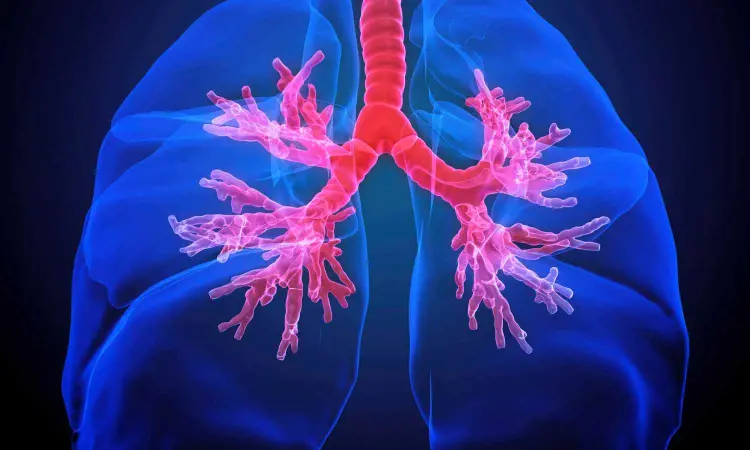- Home
- Medical news & Guidelines
- Anesthesiology
- Cardiology and CTVS
- Critical Care
- Dentistry
- Dermatology
- Diabetes and Endocrinology
- ENT
- Gastroenterology
- Medicine
- Nephrology
- Neurology
- Obstretics-Gynaecology
- Oncology
- Ophthalmology
- Orthopaedics
- Pediatrics-Neonatology
- Psychiatry
- Pulmonology
- Radiology
- Surgery
- Urology
- Laboratory Medicine
- Diet
- Nursing
- Paramedical
- Physiotherapy
- Health news
- Fact Check
- Bone Health Fact Check
- Brain Health Fact Check
- Cancer Related Fact Check
- Child Care Fact Check
- Dental and oral health fact check
- Diabetes and metabolic health fact check
- Diet and Nutrition Fact Check
- Eye and ENT Care Fact Check
- Fitness fact check
- Gut health fact check
- Heart health fact check
- Kidney health fact check
- Medical education fact check
- Men's health fact check
- Respiratory fact check
- Skin and hair care fact check
- Vaccine and Immunization fact check
- Women's health fact check
- AYUSH
- State News
- Andaman and Nicobar Islands
- Andhra Pradesh
- Arunachal Pradesh
- Assam
- Bihar
- Chandigarh
- Chattisgarh
- Dadra and Nagar Haveli
- Daman and Diu
- Delhi
- Goa
- Gujarat
- Haryana
- Himachal Pradesh
- Jammu & Kashmir
- Jharkhand
- Karnataka
- Kerala
- Ladakh
- Lakshadweep
- Madhya Pradesh
- Maharashtra
- Manipur
- Meghalaya
- Mizoram
- Nagaland
- Odisha
- Puducherry
- Punjab
- Rajasthan
- Sikkim
- Tamil Nadu
- Telangana
- Tripura
- Uttar Pradesh
- Uttrakhand
- West Bengal
- Medical Education
- Industry
Global warming can lead to inflammation in human airways, new research shows

In a recent, cross-institutional study partially funded by the National Institutes of Health, researchers report that healthy human airways are at higher risk for dehydration and inflammation when exposed to dry air, an occurrence expected to increase due to global warming. Inflammation in human airways is associated with such conditions as asthma, allergic rhinitis and chronic cough.
Researchers say that as the Earth’s atmosphere heats up, with relative humidity staying mostly the same, a property of the atmosphere called vapor pressure deficit (VPD) increases at a rapid rate. VPD is a measure of how “thirsty” for water air can be. The higher VPD becomes, the greater the evaporation rate of water, thus dehydrating planetary ecosystems.
Based on mathematical predications and experiments, researchers now explain that higher VPD can dehydrate upper airways and trigger the body’s inflammatory and immune response. In the full report, published March 17 in Communications Earth & Environment, they also say that such dehydration and inflammation can be exacerbated by mouth breathing (rates of which are also increasing) and more exposure to air-conditioned and heated indoor air.
“Air dryness is as critical to air quality as air dirtiness, and managing the hydration of our airways is as essential as managing their cleanliness,” says lead author David Edwards, adjunct professor of medicine at the Johns Hopkins University School of Medicine. “Our findings suggest that all mucosa exposed to the atmosphere, including ocular mucosa, are at risk in dehydrating atmospheres.”
Edwards and the team first looked at whether transpiration, a water loss process that occurs in plants, occurs in mucus of upper airways exposed to dry air environments. High rates of transpiration have proven to cause damaging compression to cells within the leaves of plants, threatening plant survival. The team also sought to see if such compression occurred in upper airway cells.
Researchers exposed cultures of human cells that line the upper airway, known as human bronchial epithelium, to dry air. After exposure, the cells were evaluated for mucus thickness and inflammatory responses. Cells that experienced periods of dry air (with a high VPD) showed thinner mucus and high concentrations of cytokines, or proteins indicating cell inflammation. These results agree with theoretical predictions that mucus thinning occurs in dry air environments and can produce enough cellular compression to trigger inflammation.
The team also confirmed that inflammatory mucus transpiration occurs during normal, relaxed breathing (also called tidal breathing) in an animal model. Researchers exposed healthy mice and mice with preexisting airway dryness, which is common in chronic respiratory diseases, to a week of intermittent dry air. Mice with this preexisting dehydration exhibited immune cells in their lungs, indicating a high inflammatory response, while all mice exposed only to moist air did not.
Based on a climate model study that the team also conducted, they predict that most of America will be at an elevated risk of airway inflammation by the latter half of the century due to higher temperatures and drier air.
Researchers concluded their work by saying these results have implications for other physiological mechanisms in the body, namely dry eye and the movement of water in mucus linings in the eye.
“This manuscript is a game changer for medicine, as human mucosa dehydration is currently a critical threat to human health, which will only increase as global warming continues,” says study co-author Justin Hanes, Ph.D., the Lewis J. Ort Professor of Ophthalmology at the Wilmer Eye Institute, Johns Hopkins Medicine. “Without a solution, human mucosa will become drier over the years, leading to increased chronic inflammation and associated afflictions.”
“Understanding how our airways dehydrate on exposure to dry air can help us avoid or reverse the inflammatory impact of dehydration by effective behavioral changes, and preventive or therapeutic interventions,” says Edwards.
Reference:
Edwards, D.A., Edwards, A., Li, D. et al. Global warming risks dehydrating and inflaming human airways. Commun Earth Environ 6, 193 (2025). https://doi.org/10.1038/s43247-025-02161-z
Dr Kamal Kant Kohli-MBBS, DTCD- a chest specialist with more than 30 years of practice and a flair for writing clinical articles, Dr Kamal Kant Kohli joined Medical Dialogues as a Chief Editor of Medical News. Besides writing articles, as an editor, he proofreads and verifies all the medical content published on Medical Dialogues including those coming from journals, studies,medical conferences,guidelines etc. Email: drkohli@medicaldialogues.in. Contact no. 011-43720751


